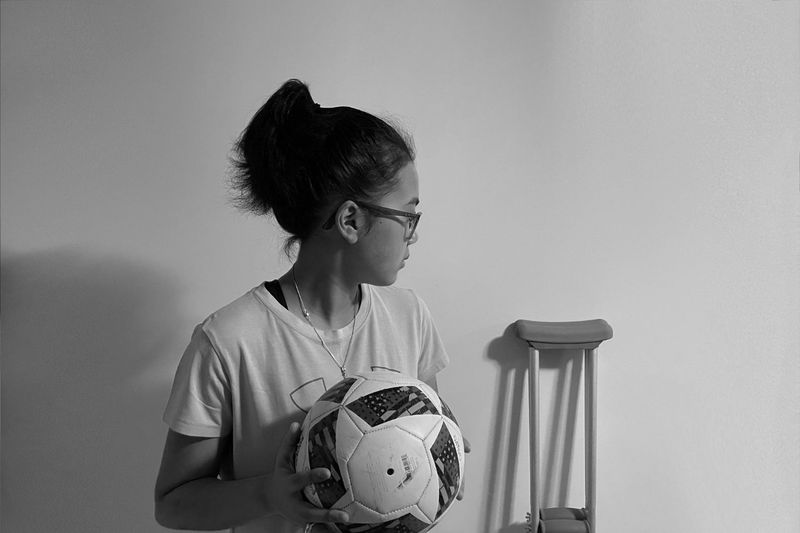We Are America
From Cleats to Crutches and Back
By Kaitlyn

North Quincy High School, Massachusetts
I was nine years old when I played in my first youth soccer game. Although I was clumsy and barely knew how to dribble, I instantly fell in love with the sport. I spent the next five years working hard to improve my technique, making new friends, and having fun every step of the way. By the time eighth grade rolled around, I was determined to play for the high school soccer team.
However, my plans abruptly changed when x-rays discovered a bone tumor in my lower left ankle. I was diagnosed with osteosarcoma, a rare type of bone cancer, in February 2019, and underwent my first round of chemotherapy soon after. Treatment was followed by a surgical procedure to remove the tumor, and when I ultimately decided to amputate my left foot, I planned for a future where I returned to playing soccer alongside my friends, despite this new challenge.
The school year began, and I went to cheer on my former teammates at their first game of the season. However, as I watched from the stands, I became restless and consumed with jealousy; I should be out on the field, I thought, not sitting here by myself. Why did my friends get to play while I did not? And from that question came another: what would my life be like if I did not have cancer?
My frustration only accumulated as I began physical therapy with my first prosthetic. Every movement was painful and exhausting, and the mountain of setbacks in front of me only seemed to grow taller. The months I spent on my crutches exceeded the expected timeframe, and then exceeded it some more. I became increasingly insecure around the mention of soccer, ashamed of the person I was with my pathetically slow progress. I also found myself wondering if my friends were embarrassed of being seen with me, and my once high self-confidence hit rock bottom. As a result, I avoided my teammates and stopped attending their games. I figured it would be better for everyone involved; the thought of my friends’ pity appalled me, and I refused to watch anyone play for the sake of my mental wellbeing.
Eventually, I switched to a new prosthetist and got a working prosthetic. Physical therapy picked up soon after, and I put aside my crutches within a few months. I spent the summer of 2020 relearning how to run and jump, working at a feverish pace in order to play soccer again.
However, summer ended, and the time came to reassess my priorities. I realized that somewhere along the line, I stopped wanting to play soccer for myself. Instead, my biggest motivation was the desire to leave behind my diagnosis and prove to my friends that I was still the same person. For months, I had tried to build a version of myself that would hide the reality of my physical limitations. I had allowed my insecurities to foster a mentality that I needed to be as “normal” as possible, despite my new identity as an amputee. Comparing myself to others with different circumstances was mentally exhausting, I realized, and had come at the cost of my love for soccer.
So, I took a step back and reset. I began to explore different ways to revive my interest in the sport, from watching professional games to passing around a ball with my best friend. Now, more than two years after my diagnosis, I’m no longer consumed with envy and self-doubt whenever I watch my friends play. Instead, I feel content with my progress and truly proud of how far I have come in my journey. And although I’m still unsure of when I will play again, that does not mean that I am letting go of soccer completely. I’m simply expressing my love for the sport in any way that I can, just like any other soccer enthusiast would.
© Kaitlyn. All rights reserved. If you are interested in quoting this story, contact the national team and we can put you in touch with the author’s teacher.